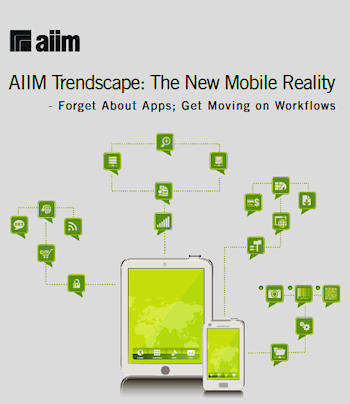AIIM Report Targets BYOD Approach To Legacy Applications

The latest Trendscape report recommends getting priorities right before implementing a mobile strategy
An IT industry think tank has been looking at the challenges being thrown up by mobile computing in enterprises using legacy applications. AIIM Trendscape concluded that organisations should focus on their workflows and processes rather than fretting about mobile devices or rushing to develop and release apps.
The AIIM Trendscape: The New Mobile Reality report was compiled by AIIM’s Executive Leadership Council (ELC), drawn from 50 -end-user contributors, including senior executives from Microsoft, IBM, HM Revenue & Customs, HP, General Electric, PwC and Box
Role Play
The ELC met with the intention of understanding what is both likely and critical for end-users to know about the role of mobile technologies in the enterprise over the next 18 to 24 months.

The group said that organisations believed mobile computers would be critical to future employee interactions with enterprise systems but have yet to scope the range of personal devices that will be used. The Trendscape report claims that they have yet to fully come to terms with Byod (bring your own device) environments.
This also brings problems in coping with varying levels of employee interactions, with many software providers adapting their offerings into more app-like versions but struggling with the “buy side” of the equation which still employs monolithic systems investment processes.
“Mobility is the primary concern for most organisations but the path to true enterprise mobility is not smooth,” said John Mancini, AIIM’s president. “Mobile technologies provide an opportunity to rethink and transform processes and workflows, so focusing a mobile strategy on devices or apps is a red herring. Because a mobile strategy cannot succeed independent of the existing systems that are in place, enterprises should begin by looking at their most critical business problems through the prism of mobility.”
“Any organisation that is still debating the criticality of mobile is missing the point and organisations that do not respond, do so at their long-term peril,” said Mancini. “The time for debating whether and how mobile technologies will impact organisations and how their customers and constituents interact with them is over. It is time to act.”